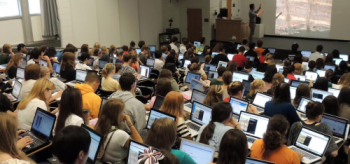End-of-Term Edition, 2014-12-12
Semi-regular reports on higher-education teaching and learning from the University of Calgary’s Faculty of Arts. By Michael Ullyot, Associate Dean (Teaching + Learning): saving your inbox from overload since 2014. Follow me on Twitter, if you do that sort of thing. Feedback and submissions are always welcome. Leave a comment below, or drop me a line.
All good things must come to an end, as they say. And so last Friday, we came to the end of Fall term. Now our students are studying for final exams, and our colleagues have led the term’s final classes and labs. In the Social Sciences elevator I overheard someone who had just delivered the final lecture of his career, before retiring in January. In the Arts Students’ Centre, SS102 (formerly the Program Information Centre) we’re decking the halls with fairy lights, and looking forward to a restorative week or two before students return in January.
Over the past few weeks I’ve written on a few different topics here on this blog, from how to start a co-op program in your department to the care and feeding of teaching dossiers. In my idle hours I’ve been posting about books I own but haven’t read (yet) and what makes a good higher-education blog post. When I’m not rearranging my bookshelves I’m trying new technologies to record my lectures (robots!). Finally, I’m lifting the hood of this blog by telling you about who reads it, and where they (you) are in the world.
I’ve been doing some thinking — again, in my idle hours — about what kinds of posts I should be writing in 2015. There’ll be more about my intro-Shakespeare course (English 205), and some of my Associate Dean (Teaching + Learning) projects underway for the new year: the ongoing curriculum reviews in four departments; the future design and delivery of the Arts and Science Honours Academy; developments toward a Digital Scholarship Lab partnership between the Faculty of Arts and the Taylor Family Digital Library; what the National Survey of Student Engagement 2014 results tell us about teaching and learning here in the faculty; and how we’re developing a list of the attributes all of our graduates have in common. It’s going to be a productive year, and I’ll continue to think out loud here in this space — in the spirit of open-source collaboration and inquiry. Thanks for reading, as ever.
 News + Announcements
News + Announcements
This will be an abbreviated (read: frantic year-end) compilation of news, mostly pasted-in from a range of sources.
Moving Programs
Quite a few of the Faculty’s interdisciplinary programs have moved to departments over the past year. Here’s a comprehensive list.
Already in the Calendar:
- East Asian Studies -> Department of Linguistics, Languages, and Cultures
- Development Studies -> Department of Anthropology and Archaeology
- Law and Society -> Department of Sociology
- Urban Studies -> Department of Geography
Not yet in the Calendar:
- African Studies -> Department of Anthropology and Archaeology
- Canadian Studies -> Department of History
- Earth Science -> Department of Geography
- Latin American Studies -> Department of History
- International Relations -> Department of Political Science
- Museum and Heritage Studies -> Department of Art
- South Asian Studies -> Department of Classics and Religion
Remaining in the Faculty of Arts:
- Arts and Science Honours Academy
- International Indigenous Studies
- Women’s Studies
University of Calgary Teaching Awards
The University of Calgary Teaching Awards recognize and celebrate outstanding contributions to teaching and learning across our campus community. The awards honour excellence in diverse contexts, by individuals and groups, and through curriculum design, educational leadership and experiential learning. The awards include opportunities for both academic and non-academic staff to be recognized. A University of Calgary Teaching Award is a distinguished honour, and we urge you to nominate your colleagues for these awards. Recipients will be celebrated at our annual Celebration of Teaching event on March 24, 2015.
Nominations for these awards close on January 26, 2015.
University of Calgary Teaching and Learning Grants
The University of Calgary Teaching and Learning Grants program supports our goal of integrating teaching and research. The grants program is designed to provide resources to integrate research evidence in teaching practice, to generate new knowledge about teaching and learning at the University of Calgary, and to support the dissemination of the results of that work to benefit others. As a result of the implementation of the Strategic Framework for Learning Technologies, there will be additional dedicated funding available to support Teaching and Learning Grants that focus on enhancing and extending teaching and learning through technology integration.
Applications for the grants are due February 23, 2015.
Help with Teaching Awards and Grants
The Taylor Institute for Teaching and Learning can provide some support in the preparation of these applications. These links provide details and associated resources from the Educational Development Unit:
- General
- Teaching Awards
- Teaching Grants
- D2L Innovation in Teaching and Learning Award (unrelated to using D2L, only sponsored by them): deadline March 1, 2015
Open Educational Resources
There’s still time for you to join a series of webinars on how to apply for funding to support Open Educational Resources (OER), which will enhance teaching, learning and research in Alberta. Included are open textbooks, which would significantly reduce the cost of post-secondary education for students in Alberta.
The deadline for expressions of interest is January 16, 2015. At the end of January, the committee will review the submissions. Their intention is for grants to be distributed to proponents of successful proposals prior to March 31, 2015. Grants will be awarded based on guidelines outlined here.
For more information about Alberta’s OER Initiative, please visit AlbertaOER.com.
 Teaching + Learning Workshops
Teaching + Learning Workshops
These are cross-disciplinary workshops that will directly affect your course designs and delivery. Each has a topic chosen by you and your colleagues, and has an immediate and concrete impact: you’ll draft a rubric or a laptop policy to use right away.
They are also expressly designed for teaching faculty in the Faculty of Arts. The Taylor Institute for Teaching and Learning offers a broader array of workshops open to you.
Here are the Faculty of Arts’ remaining workshops in Winter 2015. Some have firm dates, and some have full details if you click on the links.
- Turning a Class into a Community How to create an ethos of collaborative inquiry and common purpose with your students: Thurs 13 Jan, 11-12, SS1339
- Teaching Controversial Topics: January 27, 1-3 pm, SS 1339 and March 5, 1-3 pm, SS 1339
- “Bums in Seats”: Improving classroom attendance and participation: Wednesday, February 25, 2-3
- Preventing Plagiarism: Educating students on the meaning and implications of plagiarism, and the research habits that can prevent it: Wednesday 11 Mar, 2-3, SS1339
- Goals and Grades: Writing learning outcomes and developing an assessment blueprint: early April
- Your Teaching Dossier 2: early June
Dates and times are varied to accommodate different teaching schedules. If you can’t attend, each workshop will post online materials.
Registration for our series is required, so I can recognize your participation. (Remember, you get formal recognition if you attend three or more workshops in an academic year, or if you present in any workshop. This will testify to your professional development in merit, promotion and tenure applications.)
These are student-faculty gatherings for panel discussions and informal conversations on various topics. Each will invite a few faculty members to speak on a question, to spark conversations. Our two upcoming meetings will focus on these two questions:
Why take popular culture seriously?
Is popular culture mere entertainment, or should we take it seriously? Scholars like Simon Frith argue that popular music is an imprint of the social forces that create it. It helps us understand our society, and even Shakespeare was popular in his day. But does Suzanne Collins belong on our bookshelves next to William Blake? Should our playlists shuffle between Mozart and Macklemore? Do Hollywood movies help us understand the world, or just escape from it?
When + Where: 3 February 2015, 5pm, Faculty of Arts Lounge (SS104)
How and why should I live a creative life?
We spend far more time consuming culture than creating it. We have a fear of failure, and that makes us too timid to explore ideas and ask the questions that lead to wisdom.
The solution? We should live a more creative life, thinking and acting in ways that make new possibilities for our lives and our world. Creativity opens our minds to the world, and shapes the world to our minds.
When + Where: 18 March 2015, 5pm, Faculty of Arts Lounge (SS104)





